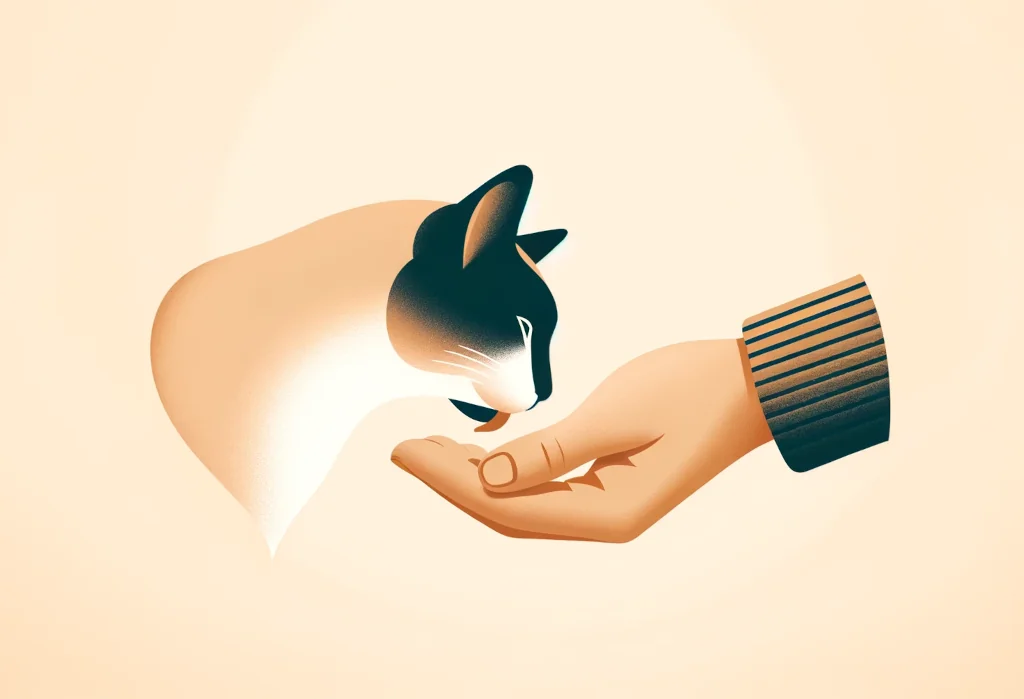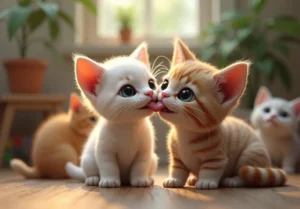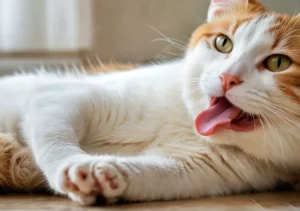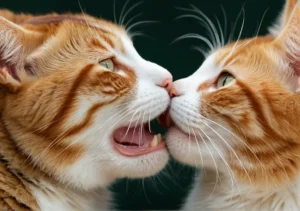
Absolutely tired of guessing games with your furry friend’s behaviors? Sometimes, your cat licks your hand, and you’re left wondering if you should be touched or concerned. In this blog post, we’re going to unwrap the mystery behind this feline gesture, providing you with clarity and understanding of your cat’s peculiar habits.
Quick Takeaways:
- Your cat’s licking can signal affection, curiosity about your day, or a call for attention; it’s a multifaceted gesture rooted in their social behaviors.
- Excessive licking might indicate stress, anxiety, or health issues, necessitating observation of behavior patterns and possibly consulting a vet.
- Nutrition impacts your cat’s behavior; a balanced diet can reduce stress-induced grooming, highlighting the importance of dietary considerations in managing excessive licking.
Affection or Attention: What’s the Reason?
Ever wondered why your furry companion seems to have a thing for your hands? Well, you’re not alone in this curiosity. It turns out there are a couple of heartfelt reasons behind this behavior. Cats lick as a form of affection or to grab your attention. This little gesture has its roots deep in their kittenhood. Just as kittens snuggle up and groom each other to show care, your cat licks your hand to express its affection towards you. It’s their way of saying, “Hey, you’re part of my family!”
On the flip side, your cat might be trying to tell you something. Perhaps it’s dinner time, or maybe they’re in the mood for some play or cuddles. Consider this: when your cat licks your hand, they might be requesting your undivided attention. It’s their gentle nudge to interact, akin to a friend tapping your shoulder to catch up.
Is Your Cat Tasting You?
Now, onto a slightly amusing thought. Is your cat sampling a taste of you? While it might sound funny, there’s a kernel of truth here. Cats possess keen sensory capabilities. Your skin collects various scents and tastes throughout the day, from the soap you used in the morning to the chicken you handled while cooking dinner. To your cat, your hand is an olfactory tapestry, rich with intriguing scents.
But here’s a nugget of information that might surprise you. Beyond just “tasting,” this behavior allows your cat to learn more about your whereabouts and activities, reinforcing their bond with you. It’s kind of like them checking in on what you’ve been up to, using their developed sense of taste and smell.
Grooming Habits Translated
Last but not least, let’s delve into the grooming aspect. Licking is a fundamental part of a cat’s grooming routine. From an early age, cats learn to groom themselves and their siblings as a way to bond and show care. When your cat licks your hand, it’s extending this social grooming behavior to you. In the feline world, this is a huge compliment! It signifies that your cat perceives you as part of its family, a trusted companion.
Moreover, this grooming behavior can be a sign of trust and relaxation. When your cat licks you, it’s not just taking care of you; it’s also feeling secure and content in your presence. It’s their way of saying, “I trust you enough to let my guard down.”
In summary, when your furry friend decides to make your hand its next grooming target, it’s doing so out of affection, curiosity, and trust. It’s a unique way cats communicate their feelings and establish a deep bond with their human companions. So, the next time your cat licks your hand, remember it’s one of the highest compliments in the cat world.
A Sign of Stress or Discomfort?
Sometimes, the sweet gesture of your cat licking your hand can carry a deeper meaning. While it’s often a sign of affection, excessive licking can be a red flag that your feline friend is experiencing stress, anxiety, or discomfort. It’s like they’re trying to soothe themselves by engaging in this repetitive behavior, almost like how humans might bite their nails or tap their feet when anxious.
Cats are creatures of habit, and any change in their environment or routine can be unsettling for them. This distress might manifest through increased grooming behaviors, including licking you more than usual. So, if you notice a sudden spike in your cat’s licking behavior, it’s time to play detective and scrutinize what’s changed. Have you moved recently? Introduced a new pet into the family? Sometimes, the cause might be less obvious, like changes in the outside environment that you may not immediately notice but can affect indoor cats.
Moreover, health issues can sometimes be at the root of this issue. Cats can’t tell us when they’re in pain or discomfort, so they communicate through their behavior. Excessive licking can be their way of signaling that something’s off. Conditions like dental disease, skin infections, or allergies might provoke increased licking.
How Should You React?
Reacting appropriately to your cat’s licking behavior is crucial for reinforcing positive interactions and addressing any underlying issues. Here’s how you can do it:
-
Observe and assess : Keep an eye out for any changes in the frequency or intensity of the licking. Try to identify patterns or triggers that might be causing this behavior.
-
Reinforce positive behavior :
- Redirect excessive licking to a more appropriate activity. Engage your cat with toys or a grooming session to help them relax.
- Use treats and praise to encourage gentle behavior. If your cat starts licking you gently as a sign of affection, a small treat or warm words can reinforce this positive interaction.
-
Eliminate stressors : If you’ve identified potential stressors, try to mitigate them. This might involve creating a more stable environment or gradually acclimatizing your cat to new pets or family members.
-
Consult with a vet : If you suspect your cat’s licking behavior might be linked to a health issue, don’t hesitate to seek professional advice. A thorough check-up can either rule out or confirm any medical concerns.
Unique Insight:
Many guides overlook the importance of diet in affecting a cat’s behavior, including licking. Nutrition plays a crucial role in mental health, not just for humans but for our feline friends too. An imbalance in certain nutrients, like a deficiency in B-vitamins, can affect your cat’s stress levels and lead to increased grooming behaviors. If your cat’s licking behavior has escalated recently, evaluating their diet could provide an unexpected solution. Sometimes, something as simple as adjusting their diet to ensure it’s complete and balanced can make all the difference. Consider consulting with a veterinary nutritionist to craft a diet that supports not just your cat’s physical health, but their emotional well-being too.
Remember, every cat is unique, and what works for one may not work for another. Observing your cat’s behavior, providing a stable and loving environment, and seeking professional advice when necessary are key steps toward understanding and addressing excessive licking behaviors. Your furry friend depends on you to interpret their needs and ensure their well-being, so maintaining an open line of communication, even if it’s through decoding their licks, is crucial.
Alex, a passionate animal lover, has experience in training and understanding animal behavior. As a proud pet parent to two dogs and three cats, he founded AnimalReport.net to share insights from animal experts and expand his knowledge of the animal kingdom.





I truly appreciate your technique of writing a blog. I added it to my bookmark site list and will